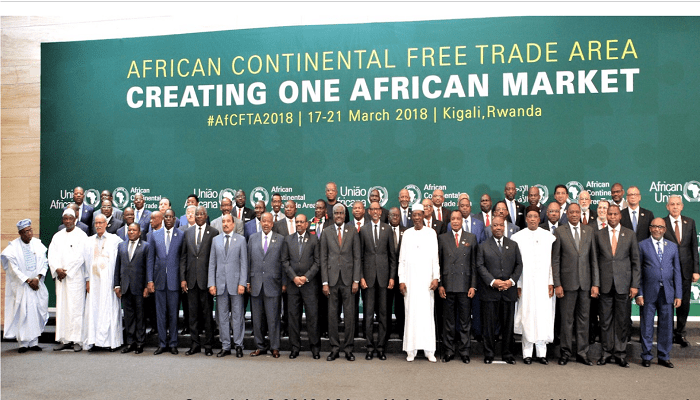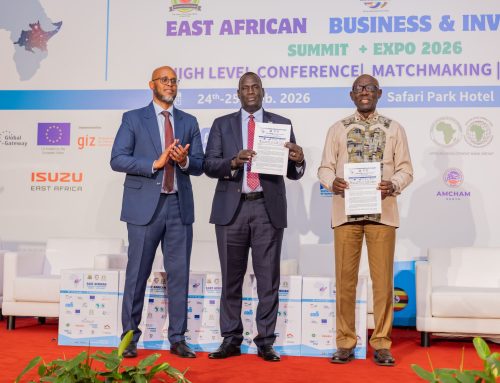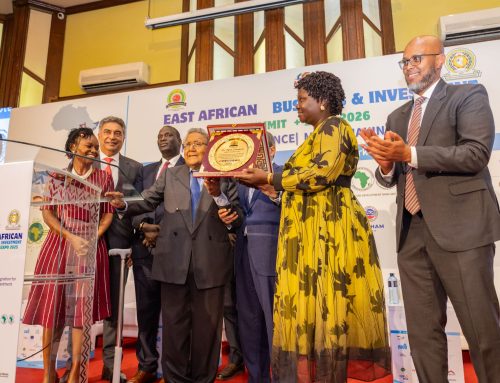Wednesday, 6th April 2022 Arusha, Tanzania: – The East African economies, already struggling to recover from a Covid-19 induced recession, face another crisis as they manage the effects from the war in Ukraine,” said Mama Keita, Director ECA Sub-Regional Office for Eastern Africa.
ECA estimates that the COVID-19 pandemic led to the contraction of Africa’s real GDP by 3 percent in 2020 and Africa’s debt-to-GDP ratio increased by 10 to 15 percentage points by 2021 from about 60% in 2019 as Governments borrowed to mitigate the socio-economic impact of the pandemic.
Speaking during the ECA-EABC Webinar on Financing Recovery from COVID-19 and Status of the African Continental Free Trade Area (AfCFTA) Negotiations and Implications to the Private Sector in the EAC, Ms. Keita explained that the Ukraine crisis has increased food prices to a 14-year high with oil prices highest since 2008. Fertilizer prices increased by 21percent since the start of the crisis.
“Africa’s recovery has been hindered by higher inflation, tighter global financial conditions, rising interest rates and the Ukraine crisis further compound the situation”, she explained. She called for public and private sector partnerships to increase intra-African agri-food, industry and services trade, to build resilience against external shocks such as the Ukraine crisis and bring back-on-track Africa’s recovery from Covid-19.
Ms Keita stressed that Africa does not need any other Marshall Plan as It has a powerful tool in the African Continental Free Trade Area (AfCFTA) to use in accelerating regional and economic integration and prepare for uncertain times.
Mr. John Bosco Kalisa, EABC CEO said, “the AfCFTA is set to increase Africa’s real income by 7 percent to USD 450 billion and intra-African trade by 81 percent by 2035 according to World Bank Study.
Mr. Kalisa called upon the Governments to facilitate trade under AfCFTA as 57 percent of Non-Tariff Barriers are due to customs procedures. He called for the full involvement of the private sector in the AfCFTA national implementation strategies, elimination of Non-Tariff Barriers and tackling information asymmetry to boost trade in Africa.
Speaking during the panel session on AfCFTA and Implications on Business in EAC, Marie-Angelique UMULISA, Principal Trade Officer, EAC Secretariat said EAC Partner States adopted the EAC Tariff Offer for Category A products (90.1 percent of total lines) and submitted to the AfCFTA Secretariat. She stated under the AfCFTA there are outstanding negotiations on Rules of Origin on important products namely Cotton, Textile, Apparel and Motor Vehicle.
Making the most out of AfCFTA
To get the most out of the AfCFTA, the role of manufacturing, services and value addition were rightly flagged up as priority areas to consider. These elements of the Free Trade Area will be deal-breakers in improving East Africa’s terms of trade and trade potential in the continental market.
Mr. Paul Makanza, the Chairman of the Confederation of Tanzania Industries (CTI) who also spoke during the webinar, called for East African firms to offer good quality and affordable products to be competitive under the AfCFTA. He urged the Governments to ensure the regulations are predictive and conducive for SMEs and Corporates to thrive and expand across East Africa and the continent.
Mr. Simon Kaheru, EABC Vice-Chair expounded that AfCFTA eliminates tariffs on intra-African trade and liberalizes trade through coordinated and harmonized legal instruments, enhancing competitiveness both at the enterprise and industrial level.
Mr. Stuart Mwesigwa-EABC Board Director, in his closing remarks, urged for more collaboration on technology and skills development in the continent.
The ECA-EABC webinar convened about 150 Senior Government Officials, Private sector players, media, academia and development partners from the EAC region.
Deepening structural reforms and diversification of productive base; Oil exporters utilizing the windfall to support economic recovery & replenishing policy buffers; Enhancing social safety nets to mitigate the impact of rising food and energy prices are some of the recommendations to Ministers of Finance and trade to support Africa’s financial recovery from COVID-19 and Ukraine crisis.
To benefit from the 1.3 billion continental markets, stakeholders recommended sensitization campaigns on AfCFTA, finalization of rules of origin under AfCFTA, ease access to trade finance, corridor development, the inclusion of SMEs and youth in AfCFTA, finalization of remaining tariff offers, value addition, harmonization of rules and procedures and trade facilitation.





